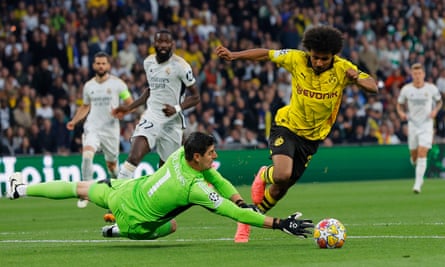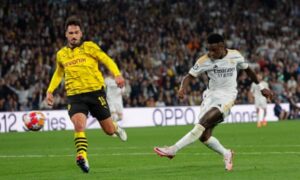The medal ceremony may be the most painful bit. Borussia Dortmund do not want to receive them, and judging by the impatience of his manner, Uefa’s Aleksander Ceferin has very little interest in handing them out. And so the medals are not so much draped around Dortmund necks as shoved on them, with a certain peremptory curtness, and without the faintest pretence that Ceferin knows or cares who most of the recipients are.
Jadon Sancho, to be fair, gets a faint flicker of recognition, a microscopic straightening of the lips only detectable by VAR. Karim Adeyemi, the man who missed those two big chances in the first half, receives a “well, what can you do” shrug. None of the rest, even the departing Marco Reus, are granted so much as eye contact by the Uefa president. Julian Ryerson rips his medal off at the first opportunity. Edin Terzic, the coach, is moist in the eyes. Meanwhile there are Dortmund fans in the stands with crumpled faces, broken and vengeful. Angry at whoever dared allow them to hope.
It was instructive to see whose heads went down when Vinícius Júnior scored the inevitable second goal to put the result beyond doubt. Sancho collapsed to the ground. Reus stared blankly into space. Mats Hummels glared wistfully at the celebrating Madrid players. Only Niclas Füllkrug stood in the centre circle, vigorously clapping his hands, exhorting his teammates for one last effort: “Yes, you’re still new here, aren’t you.” The Dortmund cup is a cup of sadness, and sooner or later everyone must take a sip.
We will probably hear a lot about Madrid’s “winning DNA” in the coming days. The confidence, the knowhow, the swagger, the special sauce. As if this is simply some enchanted tale of sporting alchemy, some innate winning essence, rather than the ability to leverage and keep leveraging a position of historical and financial dominance. Funny how – as Gary Player almost quipped – the longer you spend at the top of the Deloitte Money League, the more “winning DNA” you acquire.
And so for teams of Dortmund’s size – pretty rich in the scheme of things, but still with half the income and 7% of Madrid’s Champions Leagues wins – these finals have a tendency to become something of a self-fulfilling prophesy, in which the better team with the better players and the better coach somehow manages to struggle through. Such was the case on Saturday night, as Dortmund poured numbers forward, nailed their gameplan, ran with vigour and intelligence, tried their very hardest to outrun reality.

In this reality – a reality so succinctly imagined by Jürgen Klopp more than a decade ago – you really can beat the house. You can turn the tables on the bigger clubs by deploying better tactics, by scouting smarter, by running harder, by screaming louder. Roared on by 25,000 of their own in the stadium, and thousands more on big screens back home, Dortmund set about a strangely flat Madrid like a team who on some level were already condemned.
So Emre Can set about Jude Bellingham, Ryerson and Sancho closed down Vinícius, and when Dortmund got the ball they moved it with speed and prejudice. On 20 minutes Adeyemi met a brilliant through ball from Hummels, took it around the goalkeeper, but unfortunately also took it around the six-yard box, the photographers, the stewards in the corner and most of Green Car Park 6. Seven minutes later, in a similar situation, another heavy touch allowed Thibaut Courtois an easy save.
after newsletter promotion
And really, when you boil it down, that was it in terms of genuine openings. Füllkrug had a couple of chances that were offside, Dortmund continued to counter and cross with impunity, so many players had superb games – Hummels, Gregor Kobel, Marcel Sabitzer, Julian Brandt. But football is a game of outcomes wrapped up in a game of processes, and if Dortmund spent 74 minutes winning the processes, ultimately the difference was a grave defensive error and a headed goal from one of the smallest players in the Madrid side.
We can, of course, point fingers and assign blame, as you always can in these instances. Adeyemi for missing those chances, Füllkrug for failing to track the run of Dani Carvajal, Kobel for over-committing towards his near post, Ian Maatsen for giving the ball away in the buildup to the second goal. But to do so is largely to miss the point that the very essence of sporting greatness is the ability to do the thing that is required, when it is required. Arguably if Dortmund had not made those errors, they would not be one-time champions Borussia Dortmund; they would be 15-time champions Real Madrid.
And as Klopp looked on glumly from his private box, it was hard to escape the idea that the world he and Dortmund built together already belongs to memory. For these days the bigger clubs also have the smarter scouting networks, the better organised press, the more impressive medical department.
Terzic, for all his skills and competencies, is no Klopp-level genius. Can is no Ilkay Gündogan, Füllkrug no Robert Lewandowski, Reus 2024 no Reus 2013. And the lovable underdogs Dortmund, everyone’s second-favourite team, are now strategically partnered with the international weapons manufacturer helping Israel reduce Gaza to rubble.
The much-criticised deal is reportedly worth about £6m a year, and is part of Dortmund’s attempt to drag themselves a little nearer to the elite, to close the gap, however infinitesimally, to the Madrids of this world.
After all, if you can’t change reality, you may as well start working with it.
Source: theguardian.com


















